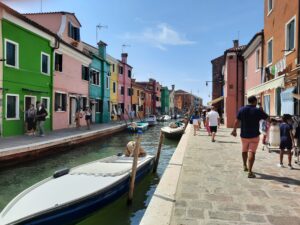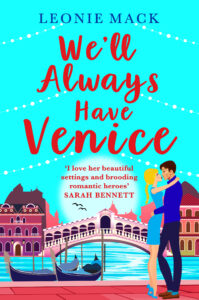 My latest book, We’ll Always Have Venice, is my second romantic comedy set in Venice and is a summer love story, following the winter adventure of A Match Made in Venice. Whereas the first book explored Murano and the ancient art of glassmaking, as well as the old city itself, the second book features the idyllic lagoon and the further islands, including Burano.
My latest book, We’ll Always Have Venice, is my second romantic comedy set in Venice and is a summer love story, following the winter adventure of A Match Made in Venice. Whereas the first book explored Murano and the ancient art of glassmaking, as well as the old city itself, the second book features the idyllic lagoon and the further islands, including Burano.
The main character, Norah, is a marine microbiologist exploring the lagoon to collect samples every weekend with her guide, rower and oarmaker Gianluca. Every weekend is an adventure, taking refuge in an island monastery during a storm, picnicking with flamingos and dodging cruise ships.
One of my favourite scenes is where they accidentally disturb some fishing nets and bump into the fisherman and his son. But they’re not catching fish. The nets contain a local delicacy only available in May. And with true Burano hospitality, they end up pleasantly tipsy on Prosecco with stomachs full of delicately fried crab.
 Gianluca squinted at the net. ‘Moeche,’ he said, a grin breaking out. He dropped her hand and strode over to the fishermen. He beckoned to Norah with quick fingers. ‘It’s crabs. Look!’
Gianluca squinted at the net. ‘Moeche,’ he said, a grin breaking out. He dropped her hand and strode over to the fishermen. He beckoned to Norah with quick fingers. ‘It’s crabs. Look!’
At the word ‘crabs’, she shrank back. Crustaceans were her least favourite form of marine life, coming in after gelatinous zooplankton and ectoparasitic flukes. She shook her head fiercely at Gianluca.
‘These aren’t just any crabs,’ said Gianluca with enthusiasm.
‘These,’ explained the fisherman grandly, ‘are nude crabs. Or they will be in some days, I hope.’
‘Did he say “nude crabs”?’ Reluctantly curious, she approached and inspected the specimen in the palm of the older man’s hand. ‘That’s carcinus aestuarii, the common green crab. And it’s about to moult. Natural behaviour for this species in spring, I believe.’
‘But have you ever eaten it, fried lightly in oil?’ Gianluca said, his face lit up. He turned to the older man and spoke in rapid dialect. A moment later, they were shaking hands and clapping each other on the shoulder like long-lost friends.
Norah watched with a smile tugging on one side of her mouth. Her brain filled in the blanks of the conversation:
‘For your nòna, I will give you a good price – and because you can speak my dialect!’
‘I have always wanted to meet a nude crab fisherman!’
‘Lucky for you the crabs are nude and not the fisherman – bahahaha.’
 They followed Emiliano and Daniele back to the island of Mazzorbo, where they sorted the crabs into submerged baskets according to the imminence of their moulting and retrieved the jelly-like specimens that had already shed their shells and were crawling around nude.
They followed Emiliano and Daniele back to the island of Mazzorbo, where they sorted the crabs into submerged baskets according to the imminence of their moulting and retrieved the jelly-like specimens that had already shed their shells and were crawling around nude.
Norah’s stomach rumbled as Gianluca rowed up to Burano. Earlier that day, they’d stopped for lunch at an osteria on the eastern side of the island, but she hadn’t seen the main canal. The fondamenta was bustling with tourists visiting the lace ateliers or stopping at market stalls, and locals wandering to their favourite spots for their evening aperitivo. The brightly coloured houses – sky blue, hot pink and lime green – were a shock after the graduating greens, blues and browns of the lagoon. Flapping laundry hung from ropes under the upper windows. The buildings were only two or three storeys high, making the island feel like a village in comparison to its grand old sister to the south.
